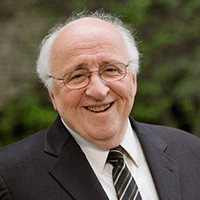During my years teaching undergraduates at Calvin College, we had a rule that the first class period of the day was to be opened with prayer. One of our historian colleagues liked to tell the story about a semester in which he taught two sections of Western Civilization, one at 8 a.m. and the other at 9. He covered exactly the same material in both classes, with the only difference being that he prayed at the beginning of each 8 o’clock class session, but never in the 9 o’clock class. When the student evaluations were turned in at the end of the course, he received much higher ratings from the students in the earlier class on the question of how well he integrated faith and learning into his subject matter.
We often chuckled when this story was told, taking it as evidence that a little piety went a long way with our naïve students on questions of faith-and-learning integration. But I have come to think that the lesson here was more important than we took it to be in those days. His prayers in the first class created a mood. They offered spiritual reassurance. They provided the students with a spiritual context in which to understand his overall intentions. The story suggests to me that we need to pay much more careful attention to the topic of the relationship of prayer to learning.
I started thinking more seriously about this subject of prayer and learning when I read Mark Schwehn’s 1993 book “Exiles from Eden: Religion and the Academic Vocation in America.” Schwehn makes the case that academic communities of the past were undergirded by such “spiritual” virtues as humility, faith, self-denial and love. These qualities -- absolutely essential for maintaining academic community -- were intentionally sustained in the past by liturgical practices and symbol systems that are intimately intertwined with religious convictions. The Western academy emerged out of worshipping communities, after all. And, as Schwehn boldly states his case, “the continued vitality [of academic life today] would seem to be in some jeopardy under wholly secular auspices." Schwehn suggests much of the academy today is "living off a kind of borrowed fund of moral capital.” For example, to the degree that the virtues that are crucial for a sense of communal academic trust are still present in the broader academy, they are drawing on resources from past spiritual practices that are no longer seen as necessary to the intellectual quest.
Those of us, then, who pursue our academic callings in contexts where the practices of piety are encouraged should consider ourselves blessed. We have the privilege of worshipping together, communally repenting of our sins and renewing our shared commitments before the face of God. But that is not only a privilege. It brings with it obligations. For one thing, it is important to include in our prayers those colleagues of faith who labor in academic environs where those practices are not encouraged. Indeed, by energetically maintaining our practices of spiritual formation we are performing an important service for the larger academy -- by keeping alive a focus on those conditions that are crucial to the academic vocation in general.
And those are all good reasons to keep praying in class these days.
Richard Mouw is president of Fuller Theological Seminary in Pasadena, Calif.














